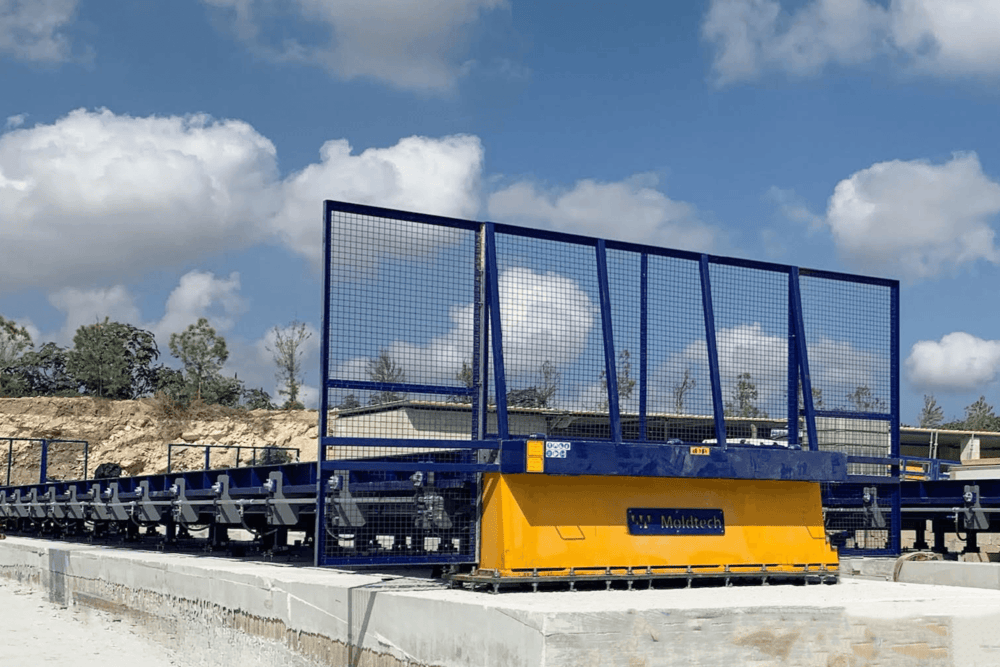Why Prefab Concrete Slabs Matter for Efficiency and Sustainability
Prefab concrete slabs are transforming the way we build: they reduce construction labor, reduce waste, and accelerate timelines. At Moldtech, we’ve seen firsthand how these precast concrete solutions reduce project timelines by up to 40%. In an era where efficiency and sustainable construction practices are non-negotiable, precast concrete slabs allow us to deliver consistent quality while minimizing environmental impact.
What Are Prefab Concrete Slabs?
Precast concrete slabs are prefabricated floor or roof panels produced under controlled conditions. They range from simple flat slabs for residential floors to highly prestressed elements for industrial facilities. Commonly used in multi-story buildings, parking garages, and modular housing, these slabs arrive on site ready for rapid installation, without the need to wait for formwork to set or weather delays to compromise progress.
Key Benefits of Prefab Concrete Slabs
Faster Project Timelines
One of the biggest advantages we highlight is the speed of installation. In a recent project in the US, our Slab Prestressing System solution cut slab production time in half and was perfectly synchronized with on-site personnel. Meanwhile, the Tilting Table for Panel Production in Canada allowed a manufacturer to pour and demold multiple slabs in a single shift, dramatically increasing productivity.
Cost Efficiency
Prefab concrete slabs reduce labor hours and material waste. A common mistake we see is overestimating on-site formwork costs until clients compare it to our fixed tables, such as the Canadian Self-Supporting Prestressed Panel Table. On that project, the client reduced total slab costs by 15% thanks to casting accuracy and reduced handling.
Consistency and Quality
Quality control in a factory translates into consistent strength and finishes. In Mexico, our tilting tables for industrial construction panels ensured that each slab met tolerance requirements, avoiding the “one panel fits and the next doesn’t” problem that sometimes plagues on-site pours.
Real-World Applications
Precast concrete slabs stand out in:
- Residential developments, as demonstrated by our US project with custom PBU molds for modular homes (Residential Building Equipment and PBU Molds in the US).
- Commercial parking decks, where prestressed slabs span longer distances without columns.
- Industrial buildings that benefit from resilient panels with integrated service channels.
These cases demonstrate that precast slabs are not a one-size-fits-all solution: we tailor each solution to the project’s needs.
Moldtech’s Expert Insights
Lessons Learned from Our Projects
In our experience, a common mistake is underestimating transportation logistics. At a U.S. prestressing plant, we refined slab dimensions to optimize truck loading, reducing shipping costs by 12%. We’ve learned that early coordination (plant, transportation, and construction) makes all the difference.
Innovating with Technology
The interesting thing here is how we adapt advanced technology, such as hydraulic turning systems and 3D molds, to maximize efficiency. Our equipment allows for rapid configuration changes, which is key in plants with mixed wall and slab production.
Future Trends in Prefab Concrete Slab Technology
Looking ahead, further integration of digital twins and IoT sensors is expected in slab casting. These trends will boost construction efficiency by enabling real-time quality monitoring. Furthermore, bio-based additives and high-performance mixes will make precast slabs lighter, stronger, and more environmentally friendly.
Partner with Moldtech for Prefab Solutions
Prefab concrete slabs offer speed, cost savings, and quality that traditional methods can’t match. If you’re considering implementing prefab concrete slabs into your next project, Moldtech can assist you in finding the best solutions tailored to your needs.




